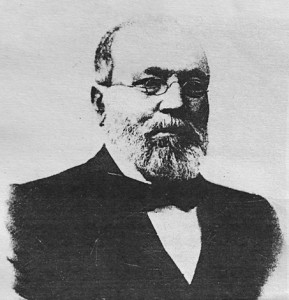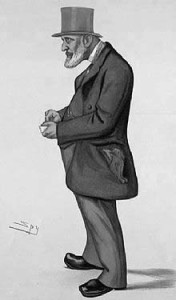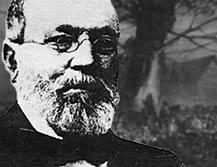Description
Meet Joseph Arch (1826-1919), the son of a Warwickshire shepherd, who worked in the fields from the age of 9, and would go on to play a leading role in the formation of the National Union of Agricultural Labourers in 1872 — an event Karl Marx would call the ‘Great Awakening’.
 In his autobiography From Ploughtail to Parliament (1898), Arch explains that when he was young it was still widely understood that education for the working classes should be restricted to the religious doctrine of the catechism. Too much ‘book learning’, he wryly continues, would make a man born to a life of labour wish for more than his lot, ultimately making his life unbearable. He suggests the following might have been a good motto for inscription on the door of his school:
In his autobiography From Ploughtail to Parliament (1898), Arch explains that when he was young it was still widely understood that education for the working classes should be restricted to the religious doctrine of the catechism. Too much ‘book learning’, he wryly continues, would make a man born to a life of labour wish for more than his lot, ultimately making his life unbearable. He suggests the following might have been a good motto for inscription on the door of his school:
“Much knowledge of the right sort is a dangerous thing for the poor.”
During and after his presidency of the Union, Arch became something of a folk legend in his own time. It was, for example, not uncommon for the more committed NUAL members to hang his portrait in their homes. Ballads were even composed about his championing the working man. One such chorus ran:
Joe Arch he raised his voice,
’twas for the working men,
Then let us all rejoice and say,
“We’ll all be union men.”
 Throughout his childhood, he tells us, he was exposed to two bodies of literature: “Shakespeare and the Bible were the books I was brought up on, and I don’t want any better. I have heard and read a good deal since then, but I have never come across anything to beat them.”
Throughout his childhood, he tells us, he was exposed to two bodies of literature: “Shakespeare and the Bible were the books I was brought up on, and I don’t want any better. I have heard and read a good deal since then, but I have never come across anything to beat them.”
Entirely content, it would seem, without the ancient Greek and Roman classics in his life, Joseph Arch — as the title of his memoirs suggests — rose steadily through the social ranks, from farm labourer, to Primitive Methodist preacher and ultimately Member of Parliament. After Arch’s social apotheosis, songs about him in some quarters became altogether less flattering:
Joseph Arch he stole a march,
Upon a spotted cow.
He scampered off to Parliament,
But where is Joseph now?
 By this point, Joseph had led nothing short of a monumental breakthrough in the fledgling British struggle for social reform. While his comrades sang, Arch was by no means idle. He appears to have been in the library reading the emergent landmark treatises on English agricultural labour by writers such as Thorold Rogers and Robert Sherard — of The White Slaves of England (1897). Rogers was a liberal politician, clergyman, and economist. He wrote an enormous book entitled Six Centuries of Work and Wages: A History of English Labour (1884), and in it his readers — including Arch — came across a quotation of a Greek poet, employed by Rogers in his defence of Arch and the Union against contemporary criticism. In his memoirs Arch reproduces Rogers’s defence word for word, and in so doing the same classical quotation. In a section called The Value of Agricultural Unions Rogers wrote: “The first condition under which a workman can be expected to be honest and intelligent, efficient and effective, is that he should have a sense of self-respect. Half a man’s worth, says the Greek poet, is taken away on the day that he becomes a slave.” The “Greek poet” paraphrased by Rogers is none other than the epic poet Homer and the words in question come from his Odyssey book 17 lines 322-3: ”If you make a man a slave, that very day | Far-sounding Zeus takes away half of his wits (or ‘goodness / virtue’ – ἀρετή)”. Rogers did not, however, quote Homer directly, but can instead be seen to repurpose a passage found in another ancient literary text, Plato’s Laws: “And our wisest poet, too… declared that — “Of half their wits far-thundering Zeus bereaves those men on whom the day of bondage falls” (Laws 6.777e-a).
By this point, Joseph had led nothing short of a monumental breakthrough in the fledgling British struggle for social reform. While his comrades sang, Arch was by no means idle. He appears to have been in the library reading the emergent landmark treatises on English agricultural labour by writers such as Thorold Rogers and Robert Sherard — of The White Slaves of England (1897). Rogers was a liberal politician, clergyman, and economist. He wrote an enormous book entitled Six Centuries of Work and Wages: A History of English Labour (1884), and in it his readers — including Arch — came across a quotation of a Greek poet, employed by Rogers in his defence of Arch and the Union against contemporary criticism. In his memoirs Arch reproduces Rogers’s defence word for word, and in so doing the same classical quotation. In a section called The Value of Agricultural Unions Rogers wrote: “The first condition under which a workman can be expected to be honest and intelligent, efficient and effective, is that he should have a sense of self-respect. Half a man’s worth, says the Greek poet, is taken away on the day that he becomes a slave.” The “Greek poet” paraphrased by Rogers is none other than the epic poet Homer and the words in question come from his Odyssey book 17 lines 322-3: ”If you make a man a slave, that very day | Far-sounding Zeus takes away half of his wits (or ‘goodness / virtue’ – ἀρετή)”. Rogers did not, however, quote Homer directly, but can instead be seen to repurpose a passage found in another ancient literary text, Plato’s Laws: “And our wisest poet, too… declared that — “Of half their wits far-thundering Zeus bereaves those men on whom the day of bondage falls” (Laws 6.777e-a).
The 19th-century economist therefore updated Plato’s discourse on slavery (and its Homeric quotation) to suit his own argument for the liberation of the rural labourers from their slavish conditions through unionisation.
Although Arch had no interest in the classics per se, his life — as an educated reader committed to the emerging politics of freedom — was soaked through with the revolutionary uses of ancient Greek and Roman texts made by his classically-educated fellow reformists.







